Ricky Ford
Five or Six Shades of Jazz
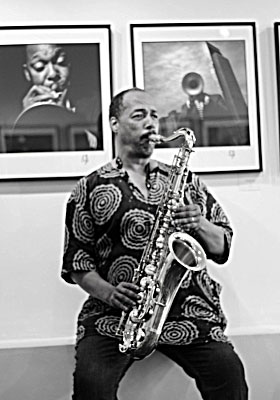
Ricky Ford is a complete artist. As a wanted sideman, a prolific composer, a unique teacher, an artistic director of the Toucy Jazz Festival that he founded in 2008 in French region Bourgogne, a surprising painter, the tenor saxophonist has been exploring different aspects of art throughout his career.
Born on March 4th, 1954, he was trained at the New England Conservatory of Music as soon as 1968. His teachers were Gunther Schuller, Ran Blake, Jaki Byard, George Russell, Joe Allard et Joseph Maneri before Mercer Ellington invited him to join the Duke Ellington Orchestra just a few months after the passing of Duke Ellington and Paul Gonsalves. Then, he went on to work with Charles Mingus (1976-1977), Dannie Richmond (1978-1981), Lionel Hampton (1980-1982), Abdullah Ibrahim (1983-1990), Mal Waldron (1989-1994), not forgetting the many recording sessions with Yusef Lateef, Sonny Stitt, McCoy Tyner, Freddie Hubbard, Amina Claudine Myers, Sathima Bea Benjamin, Steve Lacy, to just name a few. As a comprehensive musician, Ford has always strived to master different musical genres, from swing to hard bop to free, and focusing more closely for these past years on the works of Turkish poet and musician Neyzen Tevfik (1879-1953).
As a leader, Ricky Ford has recorded 21 albums and authored a vast repertoire of originals. The musician has proved to have sharp knowledge and is continually looking for new forms of expression. Ford is also a unique arranger and conductor. From 1985 to 1996 he led Brandeis University’s big band, arranging the works of composers whose music had never been played by big bands. When he settled in Paris in the 1990s, he created another big band before moving to Turkey to teach at the Istanbul Bilgi University (2000-2006). For the past years, Ricky Ford has been working with Ze Big Band, conducted by Fred Burgazzi, with who he has recorded two beautiful albums, 7095 (2009) and Sacred Concert (2013). Last March, Ford and Ze Big Band created Sketches of Brittany at the Jazz Festival of Vitré, in Brittany. Ricky Ford never stops to create.
Interview by Mathieu Perez
© photo Jimmy Katz, Tom Marcello, Alain Dupuy-Raufaste, Mathieu Perez, by courtesy
© Jazz Hot #668, Summer 2014
Jazz
Hot : On March 4th, you celebrated your 60th birthday at Selmer in Paris. You performed solo the works of Turkish musician, poet Neyzen Tevfik (1879-1953). When did you become interested in him?
Ricky Ford : A student told me about him when I was teaching in Istanbul. So I bought one of his CDs and transcribed it.
How many works are there?
He made hundreds of records between 1900 and 1910. But only seventeen are left. All of the others were destroyed.
Your project is to transcribe his works?
It’s a giant study. (He unfolds a 26-foot long score) To do this, you need a lot confidence in yourself. When I play, it sounds like I’m improvising but actually I’m reading. I had to invent the rhythms I wanted to play. It’s like a phonetic rhythm. This is original composition. It’s not a copy. For me, to master this music is an incredible project. It’s a good study. I’m the first one to do this. No one has had the patience. Plus Tevfik is taboo.
You told me that Jaki Byard "read” his improvisation during July in Paris that was recorded live in 1998.
Jaki was reading all of his music. He wrote out all of his solos like I do with Tevfik. I couldn’t believe it. Jaki told me that Earl Hines used to do that too. Maybe Oscar Peterson did the same thing. To play the exact set note for note just so that no one could bootleg it. This is why he did it. It’s incredible. The only thing that wasn’t written down was my tune. He had to improvise on my tune.
So Tevfik never wrote any of his music down?
Never. Maybe it’s more profound. Charlie Parker signed contracts that stipulated he had to write his compositions on the saxophone. There are different ways to write music but to do it by ear is very important. Right now, I’m "de-developping”. Tevfik chose another path. He doesn’t resemble any other composer. Maybe he heard blues or classical music. He had no peer pressure. He always thought about his poetry.
Is this music esoteric?
Music cannot impart emotion. It doesn’t say anything. It doesn’t communicate with you in a verbal way. Maybe Tevfik is saying something in his music. Maybe he was writing poetry. We’ll never know.
Will you play this in Turkey?
I’m going to Turkey in May. I arranged Tevfik’s music for a symphony orchestra. I wish I could play the music more. But I will. My former students say I did something important for Turkish music.
Have you always been surrounded by music?
My grandmother played guitar. She was a part of the International Sweethearts of Rhythm. It was an all-female band from the 1940s. They sounded like Count Basie a little bit. Eddie Durham did some arrangements for them. He was the arranger for Count Basie.
First you started playing drums. When did you shift to tenor saxophone?
I was playing melodica. My father suggested that maybe I should play tenor saxophone. My father had a collection of original Savoy records of Charlie Parker and some of Lester Young, Billie Holiday, Dave Brubeck and Paul Desmond. He had a couple of records of Coleman Hawkins, Ben Webster, stuff like that.
You wanted to become a musician because of Rahsaan Roland Kirk, is that correct?
I met Rahsaan and I realized that I wanted to be a musician. He was a friend of my father.
Did you ever play with him?
I used to sit in with him. He would come to Boston at the Jazz Workshop. It was on Boylston Street, right across the street from Lord & Taylor. Whenever a musician would come to town, they had a jam session. I think it was on Saturday afternoons. So I sat in with Archie Shepp, Sam Rivers, Mingus and Rahsaan Roland Kirk. But this was years later after I started playing.
What memories do you have of playing with Rahsaan?
One day I started circular breathing. Rahsaan would do this. It was on the last tune of the last Saturday night. We’re going one minute, two minutes and he’s starting to get pissed. I stopped circular breathing on the last note. He said: "It’s a good thing you’re stopping because if you didn’t, we’d be here ‘til five o’clock in the morning!” (Laughs) He was really pissed! (Laughs)
It was in Boston that you played with Sonny Rollins…
I sat in for one week with Sonny Rollins. He asked me to come back every night. Ray Riperton, Minnie Riperton’s brother, and I played at Paul’s Mall. He told me he’d take me on the road with him. After the summer he finally hired Rufus Harley. I called him up and asked him why he didn’t take me. He said "If I took you with me, I’d have to work too hard.” (Rires) There are two ways to take that…
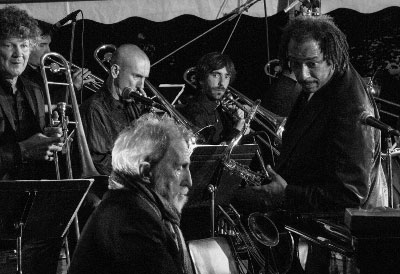
Ran Blake (see Jazz Hot #667) had suggested you should go and study at the New England Conservatory of Music (NEC)…
I met Ran Blake through one of my best friends. He was working at Hayes-Bickford’s Cafeteria, which was across the street from the Conservatory. Ran used to eat there. He knew that I loved music and told me that I should go to the Conservatory.
How old were you when this happened?
I was 15, 16 years old.
Who was teaching at NEC when you got there in 1968?
Joe Allard. He picked Harry Carney bass clarinet’s mouthpiece. He did the same thing with Eric Dolphy. He gave them a lot of advice. He also taught for Micheal Brecker, Dave Liebman, Bob Berg, Larry Snyder, Steve Grossman. My other teachers were George Russell, Ran Blake, Gunther Schuller, Joseph Maneri and Jaki Byard.
At that time, the department had just started. What was the atmosphere like?
It was a unique environment. Everything was fresh and new. By the time I got there, the department was beginning to be in full swing. They recruited many people from Berkeley, like Bill Saxton, Stanton Davis, Lenny White. Last year was the music department's 40th anniversary.
Was Ran Blake using his method by ear (see Jazz Hot #667)?
Yes but he was doing it in the context of the Community services department. He wasn’t a faculty member yet.
Were there many students?
NEC was looking for students. They weren’t that many people interested in jazz at that time.
Was the department already focused on Third Stream?
No, it was a jazz department.
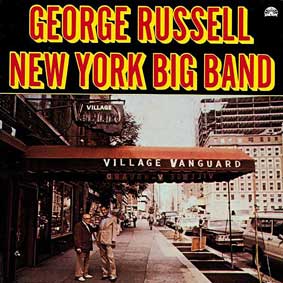
What kind of a teacher was George Russell?
He was like a polyglot. A conservatory teaches the classical conceptions of the composers. There is a certain way to think about music and solfeggio. George Russell offered another way to think about music improvisation and music analysis that is applied not only to music improvisation but also to music analysis of contemporary classical music. So there were two approaches, music performance and musicology. And he had a lot of experience to back it up with, you know, Miles Davis, Art Farmer, Gerry Mulligan. He influenced the modal playing of the 1950s.
Was he a good teacher?
I was the only person to flunk his class. So he was a good teacher. For some reason, I flunked his class and I should have been the last person to flunk his class. In 1999, I wrote a song called "Blues Work” which uses two chords, a D minor and an A flat seventh. By 2004, he had just redone his book. I saw him in Boston and told him about this song that I wrote in 1999. He said: "It sounds like you read Chapter 25 of my new book.” So, I think that at that moment I passed! (Laughs)
What was Gunther Schuller teaching?
He was more of a lecturer. He would talk about conducting. At that time, he transcribed some of Duke Ellington’s earlier works. I was in his ensemble too. I remember seeing him in his basement transcribing the recordings. In fact maybe I learned this (He points out the scores of Tevfik) by watching him. I applied this concept to Tevfik’s music.
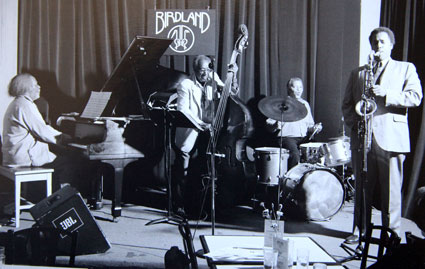
What did you study with Jaki Byard?
I studied big band writing with him and was in his big band for three years. He was a consummate historian. He was a master of all styles. He was a big influence on me. He knew all the styles of the piano playing. Most of the time, musicians can only play one style. This concerns maybe 90 % of the musicians. He was very ambidextrous musically. He could play three melodies at once on the piano.
He had a big band called The Apollo Stompers.
This was before he started the Apollo Stompers. I was in the first Apollo Stompers. Then he started another band on Saturday school.
You recorded with him throughout your career. What relationship did you have with him?
He was like my second father.
For your second album Manhattan Plaza in 1978, you called up Jaki Byard.
I wanted to repay him for being my teacher. It was about giving back. He brought this great tune called "Fadism”. We did a couple of his songs too.
Who were your heroes at the time?
I guess my teachers.
It was during those years at NEC that you did your first recording.
Gunther Schuller took us to Washington, D.C., to play at the Smithsonian Institution for a Duke Ellington project. It was around 1972, 1973. The first recording I ever did was with Gunther and his ensemble.
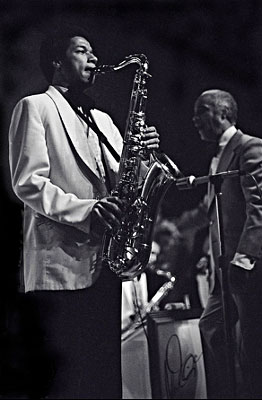
Before you played in the Duke Ellington Orchestra, had you seen the band play live?
Duke Ellington used to come to Boston once a year and play at Elma Lewis Playhouse in the Park. I used to study with Bill Saxton at the National Center for Afro-American Artists and I would go and see Duke Ellington play every summer.
How did you join the Orchestra?
A year before he passed away, I met Duke Ellington backstage and shook his hand. Colombian saxophonist Justo Almario introduced me to him. He had played in the band and was teaching at the same school that I was studying at. Then I started to study very seriously. The next year, the Duke Ellington Orchestra came back to Franklin Park in July or August. Duke had passed away in May. After the concert, there was a reception. Elma Lewis told Mercer that I was one of the most promising students in her school. Mercer told me to meet him at Copley Square on the bus and to buy a black pair of pants, a black bow tie, a shirt and some black shoes. At that point, I knew all the songs they were playing. I went on the road for two months with those guys. The first night, they called all these songs and I knew them. They were really impressed. They couldn’t believe a young guy knew the songs. And so in every other song I had a solo. I remember they used to reminisce on how they used to be like me. When Harry Carney passed away around October, Mercer called me up and I joined the band.
You took the seat of Paul Gonsalves. Had you had a chance to meet him?
I met him a couple years before he passed away.
Were you close to any musician in particular?
I was very close to Cootie Williams. We would always eat together. He would give me advice on how to play. He told me about how he grew up. He used to study with Lester Young’s father. He told me all kinds of crazy stories.
Other musicians from the Orchestra were from Boston like you.
Harry Carney and me grew up in the same neighborhood. Johnny Hodges grew up with my father. Paul Gonsalves was born in Boston too.
Would the other musicians share stories with you?
Only Cootie would. Nobody could outtalk Cootie! (Laughs) He had like an obligation to let you know about the music business, the pitfalls, etc. Back then, the music business was very abusive. If you couldn’t play, you’d get beat up musically. So there were a lot of stories about people getting beat up.
What was the relationship between the band and Mercer Ellington?
Everybody respected Mercer because he was Duke’s son. He was great person. There wasn’t much pressure because everybody knew what to do.
How much touring did you do with the band?
We went all over the world for 48 weeks. Mercer honored all the gigs that Duke signed when he was alive.
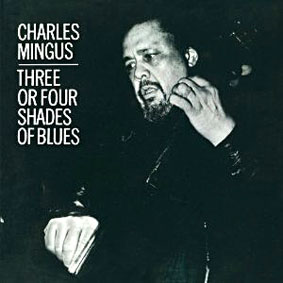
Did you know Charles Mingus before working with him?
I knew Mingus from Boston. Jaki Byard introduced me to him. I used to sit in with him at the Jazz Workshop. I was as close to Mingus as I was to Cootie Williams. We’d have dinner together. He didn’t see me for a couple of years until he saw me playing with the Duke Ellington Orchestra. That kind of freaked him out. There was a giant memorial service for the first anniversary of Duke’s death at Saint John the Divine in New York. Mingus sat in with us and played solo "In a Sentimental Mood”. We were all in the bandstand and he realized I was there. Then at the reception, someone came up to me and said: "Someone’s gonna steal you from the Duke Ellington Orchestra.” I didn’t make the connection. When I got back to the hotel, there was letter by Mingus asking me to call him. Every time I do something big in my life, I call Sonny Rollins. Before I got married, when I got to France, etc. Sonny thought that working with Mingus would be a good idea. One day in the dressing room, I was already in the band, Charles says out of the blue: "Sonny told me you called him!” I didn’t have a word to say about why I called Sonny Rollins! (Laughs) Everybody laughed! (Laughs)
Did you prepare for Mingus as you did for the Duke Ellington Orchestra?
For some reason I didn’t prepare to work for Mingus. I didn’t want to play like George Adams or Eric Dolphy or Clifford Jordan. I only wanted to play my way, which was maybe not as compatible with how Mingus wanted me to play. I got fired a couple times. But it was cool. Mingus and I talked about many things, about the philosophy of music, etc. Eventually Mingus gave up demanding that I play like George Adams. That’s the first thing he did. Then he started writing music. "I’ll fix your ass!”, he’d say. (Laughs) All those years, he wrote music that nobody could play. He wrote a bunch a real hard music that no one else could play but us, like Cumbia & Jazz Fusion, Three or Four Shades of Blues. Since he couldn’t depend on the musicians anymore, he had to depend on himself.
How did you respond to that music?
We got fired! It was hard for him. Then we gave up. We figured we would play this music as good as we can. At the North Sea Jazz Festival, Ornette Cobb heard us play the whole set and told us that we were reading all night. There wasn’t much room to improvise. So he wrote us out of the gig (Laughs) but we were still playing the gig. These things are positive. If we weren’t as adamant, Mingus would have not written new music and would have depended on us to carry his music. The proof of this dependency is that when we joined the band, Mingus had to renew all his copyrights and he never wrote out any of his music. His music was done directly in the studio. So Jack Walrath and I took 10, 20 records and wrote down the music to copyright it. It was also a challenge for him to deal with younger musicians. Many things were converging on him. Besides the situation with us, he was getting sick.
In Three or Four Shades of Blues, Mingus called George Coleman and Sonny Fortune.
I used to sit in with George Coleman at Boomer’s in New York. One day, I took a vacation in Spain. Mingus was trying to find me for a gig. Nobody could get a hold of me. I finally called home and everybody told me that Mingus was looking for me. When I got back to New York, he was so pissed that he called ten saxophonists to come at the Village Gate and try to take my gig. But I stood my ground. So Three or Four Shades of Blues was a metaphore of this giant jam session. He wanted to teach me a lesson: never miss a gig. (Laughs)
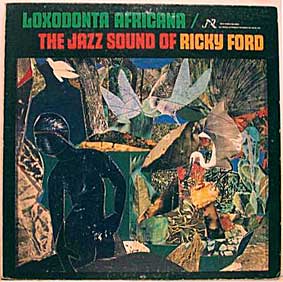
In 1977, you recorded your first album Loxodonta Africana while you were working with Mingus?
Mingus was very concerned that Gunther Schuller gave me a record date because I was working with him. Once in South America, we were on an airplane with Mingus. I took out my music paper book and began to write music. I was using half note triplets; that’s what Mingus used in his music. He was sitting next to me and started to position himself in profile. He thought that I was making a drawing of him! Then he looked over and realized that I was writing music. He looked at the book and said: "You stole my half note triplets!” (Laughs) And we all laughed about it. Then he made me publish my music in his company.
How did Gunther Schuller respond to your music?
He wanted me to turn off the lights in the studio and just improvise with Dannie Richmond. I didn’t want to do that because then we’re going back to the whole dependency of Mingus. I wanted to write music.
When did you start writing music?
At that time.
Did you have any writing experience at NEC?
In school we used to study with Joe Manieri The Theory of Harmony by Schoenberg. I did a lot of choral writing. I did a big band arrangement for Jaki Byard for his arranging class. After that, I had no opportunity to write music before my record date because I went into working with the Duke Ellington Orchestra and then Mingus. So on this airplane with Mingus, I was writing the first things I ever wrote.
You have seeked your own voice on the horn very early on. In Boston in the early 1970s, were musicians like Coltrane an influence on the others?
Nobody wanted to be influenced by Coltrane except for Michael Breker, Dave Liebman, Bob Berg, Steve Grossman. I already played with Sonny Rollins for a week, studied with Joe Allard, so I chose to go on my road.
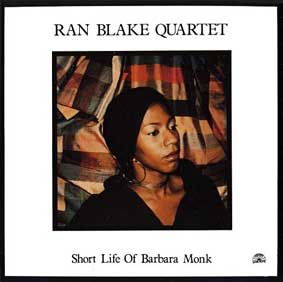
Over the years, Ran Blake is one of the pianists you recorded with the most. The first album you did together was Rapport in 1978.
Playing with Ran live is very different than playing with him in the studio. In the studio, sometimes things feel very dry. Because he was the first pianist that I worked with, I realized he was not like any other pianist. Things are a little bit more free. He doesn’t just comp. Rapport was very nebulous. I did the best I could. I thought that The Short Life of Barbara Monk was better. The album we did with Steve Lacy was very intense too. That Certain Feeling is an incredible album.
What was the New York scene like when you got there in 1974?
There were many older musicians. I was the only young cat. It was a little disappointing.
What clubs did you hang out in?
We used to hang out at the Boomer’s. George Coleman, Clifford Jordan, Harold Vick were always working there. We’d go to Ladies’ Fort, the Vanguard, etc.
What was your daily life like?
I was playing with eight different bands. I was on the road eleven months a year. Sometimes I didn’t even see my family. Some years are difficult.
Did you have any saxophonists on your mind when you were playing?
At that time, I wasn’t thinking about anybody. I wanted to play my way. Sometimes, I would think a little bit of Paul Gonsalves with the Duke Ellington Orchestra or a little bit of Dexter. I was still influenced by my theoretical studies of Schoenberg with Joseph Manieri. I was very free in terms of musical form. Harmony should dictate the amount of measures of a song. This was a thing I was trying to do.
You recorded 21 albums as leader and from the first one, you were always very concerned with original compositions.
I wanted to build a repertoire of original compositions. My idea was to write as many songs as I could. I have these songs that are like new models for the future. If you can do a 12 bar song, you can do a 15 bar song or at least prove that these things can happen. The only other composer that resembles this type of irregular form is Beethoven.
Did you ever study classical music?
When I was at Brandeis University, I had a little bit more time to study contemporary classical music composition with Harold Shapero. We would do a lot of great studies like Elliott Carter. I got a chance to meet Elliott Carter. But these composers didn’t like music performance. It’s kind of a paradox because they are writing music for people to perform it. If you asked them about Monk or Coltrane, they would say they were short-form composers. There is a certain amount of contempt from the composers for the performers. At least, it’s what I get from Elliott Carter.
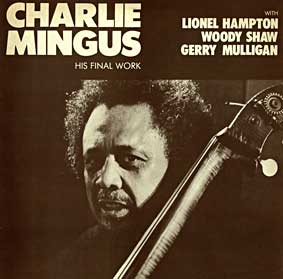
Why did you want to join Lionel Hampton’s band in 1980?
For a few reasons, research and patrimony. I love Lionel Hampton. He’s a tremendous soloist. I wanted to write for him too. I figured that the only way I could do that was if I played in his band. I also wanted to see first hand how he did it. The myth is that after you play in his orchestra, you can’t play anymore. So this was a big challenge. I wrote a couple of songs for him.
How did he respond to your compositions for him?
He loved it. He used to practice it every day. He said it was the bebop of the 1980s.
Once in the band, did you enjoy playing with the other cats?
It was one of the best bands he ever had. That’s what Lionel Hampton said.
Did you first meet Lionel Hampton for the album Presents Charles Mingus in 1977?
Yes we made a record with Mingus. That’s when I first met him.
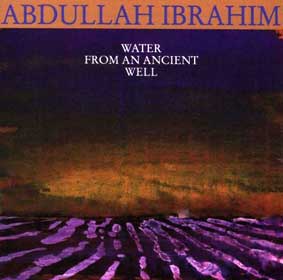
In the 1980s, you worked a lot with Abdullah Ibrahim and recorded such albums as Ekaya (1983) and Water From An Ancient Well (1985). This experience involved a lot of original music.
Abdullah put a band together and we did very well. After we left, no one could play his music like we did. Playing with him was a challenge. He was writing his own music; that’s the most important part. He loved Duke Ellington and thought he could do what Duke Ellington did. And we did it. After he broke up the band to play with a trio for a certain amount of years, he tried to put a new band together and he could find no one to play his music like we did. That was a shock for him. He thought he could do with other musicians what he did with us. The other musicians don’t have the background to do what he wanted to do. This is going back to specialty. 90 % of the musicians specialize and cannot play something else. Abdullah Ibrahim’s musicians were multifaceted. Charles Davis, Dick Griffin, Carlos Ward, Cecil McBee, Ben Riley and I could play many different ways. It was an incredible band. But he figured he could do it on his own. We were there to help him. A good musician wants to help the others. Through this act of helping, art grows. This is missing in the music today. It’s missing in art also.
You’re always looking new talent. You’re among the first to have employed Geoff Keezer, Roy Hargrove, Bob Hurst, Jeff "Tain" Watts, Christian McBride, etc. You were one of the first to have Bobby Watson on Interpretations in 1983.
Bobby was a fresh, young kid. His first record was with Clifford Jordan. Clifford was always getting the guys first! (Laughs) The same thing happened to me with Roy Hargrove for Hard Grooving (1989). He first recorded with Clifford. This maybe happened with Christian McBride too. I was always the second guy to hire them.
Based on your discography, you’ve recorded few standards.
When I recorded standards, I made sure that no one else recorded them before. Many songs on Shorter Ideas had never been done. I was the first one to record "Yes or No” since Wayne Shorter. I think so too for "Dance Cadaverous”, "Miyako” and "Pinocchio”. Same for "Take The Coltrane”. I think I was the first to record "Happy Reunion” since Duke. Then Joe Henderson caught up on it a couple years later. If you’re the first one to record standards, it’s ok. Sonny Rollins did that for most of his career.
All your albums as leader are about building a personal repertoire, who are your favorite musicians that have built a personal repertoire?
Wayne Shorter, Duke Ellington, Ornette Coleman, Albert Ayler, Don Ellis, Tom Harrell.
Most of the records you played in involve original music.
The most profound ones were with Mal Waldron. "Everybody take a five-minute solo”, he would say. A five-minute solo is intense. The average classical composition is five minutes. You can do something very intense for three minutes. I have a score of Elliott Carter in which he wrote something for three minutes. I asked him how he did that and he told he first wrote the rhythms then filled in the notes. It’s a giant construction process. Because I deal with art now, I see some of his scores that look very figurative. Maybe I should do a painting of these things one day.
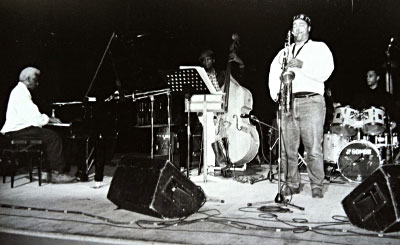
You worked with Mal Waldron from 1989 to 1994.
Mal was great person, very humorous. He knew the limericks. He was a philosopher. He played in my big band and wrote four or five songs for it.
In 1990, 1991, you settled in Paris, what was the scene like?
There is not much of a jazz scene in Paris. Back then there were not that many musicians. Many were older. A lot of Americans lived here, then moved back or passed away. Even today, I have students that came from Turkey and they feel better in Istanbul. I don’t know why. Even in New York, people don’t feel good about the jazz scene over there. On paper it looks good but in reality it’s something else. Sometimes competition can be positive otherwise there is complaisance. I don’t know…. In Paris, I have no distractions.
From Paris, how do you see the situation in New York?
It seems like they are still under the same pressure. If you want a record date, you still need to play like Eric Dolphy or something. They still have to play standards. It’s hard for musicians to be adamant. They always have to make concessions in the industry. Young musicians have fewer opportunities to be original. Things have become very programmed. That’s my impression. I don’t know if it’s related to pedagogy or marketing. Maybe today jazz is like pop art. But these are not good things to say…
You have taught a lot. Was Brandeis University your first experience as a teacher?
I had a big band there from 1985 to 1996. My thing was to develop the original repertoire of people who never had their music played in big bands before. A lot of them were pianists. It gives a big band a different type of perspective. So I arranged music of Mary Lou Williams, Ran Blake, Walter Bishop Jr., Harold Ashby, Amina Claudine Myers, Abdullah Ibrahim, Steve Lacy, all of the stuff I did with Mingus, Dave Burrell, Mal Waldron. Steve Lacy was surprised that his music fit a big band. I developed a lot of the big band concepts there. While I was working there, I studied there too and got a Master’s in composition.
In Saxotic Stomp, you paid tribute to Mary Lou Williams with the tune "For Mary Lou.”
I met her once with Ran Blake. I used to go see her with my father at the Copley Square Hotel in Boston. I knew Peter O’Brien before I left for New York and he gave me a lot of copies and scores of the Zodiac Suite. I rearranged it for the big band at Brandeis.
How did you become a teacher at the Istanbul Bilgi University? You stayed there from 2000 to 2006.
I went there to play a concert. Butch Morris was there. They called me to come and play music by Mingus. Students asked me if I wanted to teach there. By coincidence, Can Kozlu was teaching there. He used to play in my big band when he was going to Brandeis. Everything came together. Turkey gave me a lot of good ideas on how to live.
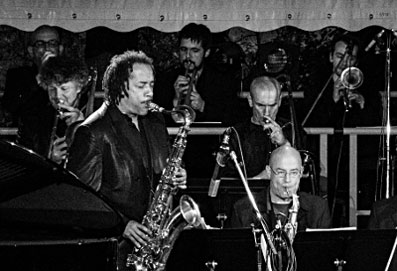 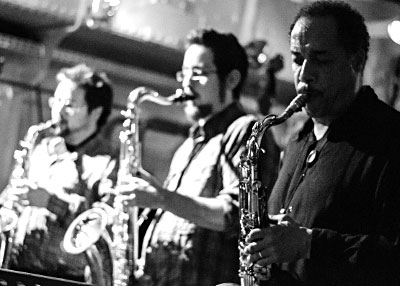
Today you work with Ze Big Band for which you wrote 7095 (2009) and Sacred Concert (2013).
I first started a big band in Paris. We would play at the Duc des Lombards or the Sunset. Fred Burgazzi was playing in my band. Then I went to Turkey. When I came back, I started to work with Ze Big Band, which is directed by Fred. We got some good musicians.
Do you have former students in the band?
No.
In 2008, you launched the project "A Great Day in Paris” in tribute to the famous photo "A Great Day in Harlem” by Art Kane. What was it about?
2008 was the 50th anniversary of the photo "A Great Day in Harlem” that Art Kane had taken in 1958 of all those jazz musicians in Harlem. I thought it would be a good idea to do the same thing with the American jazz musicians that lived in France. It took a year to prepare. Musicians from all over France came. Philippe Lévy-Stab took a group photo on the steps of Montmartre and Michka Saäl started to work on a documentary film of those musicians.
Today you live in Toucy, in Bourgogne, where you opened an art gallery. You showcase artists and also your paintings. When did you start to paint?
I started to paint in 2008.
Since 2008, you have been organizing the Toucy Jazz Festival in July. You invited Rhoda Scott and Benny Golson (2010), Archie Shepp and Ravi Coltrane (2011), Ran Blake and Bobby Few (2012), La Velle and Rhoda Scott (2013), Ze Big Band and Alain Jean-Marie (2014). How did the idea of a festival come about?
It’s a dream that I had. In 2008, I opened an art gallery and did a solo concert at the church. Many people came. And I started to think about doing a jazz festival. I wanted the jazz festival to have a certain notoriety of bringing very strong musicians to an area where no one knows about them. There’s a lot of support here. The mayor is a big jazz fan. There’s the conservatory of Auxerre not too far. I had great feedback from the people living here but also from Paris and all over.
Did a musician ever bring a piece for you in the context of the festival?
Benny Golson wrote a piece for me called "Stage Center”. It’s a very beautiful, 20-minute long piece. It had never been played before.
Who would like to invite for forthcoming editions?
Wayne Shorter, Charles Lloyd, Sonny Rollins and younger musicians too.
*
Contact
http://ricky.ford.free.fr
http://www.toucyjazzfestival.com
http://www.galerie14.org
Concert
Péniche L'Improviste, Quai d'Austerlitz, Paris, July, 2
Toucy Jazz Festival, Toucy (89) July, 18-19
Jazz Foix, Foix (09), July, 21
Discography
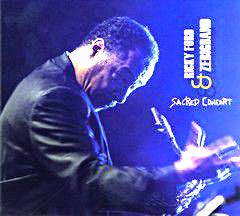 Leader-coleader Leader-coleader
CD 1977. Loxodonta Africana, New World 80204-2 (LP 204)
LP 1978. Manhattan Plaza,
Muse 5188
LP 1980. Flying Colors,
Muse 5227
LP 1981. Tenor For The Times,
Muse 5250
LP 1983. Interpretations, Muse 5275
LP 1984. Future's Gold,
Muse 5296
LP 1984. Shorter Ideas,
Muse 5314
LP 1986. Looking Ahead,
Muse 5322
LP 1987. Saxotic Stomp, Muse 5349
LP 1989. Hard Groovin',
Muse 5373
LP 1989. Manhattan Blues, Candid 79036
CD 1990. Ebony Rhapsody, Candid 79053
CD 1991. Hot Brass,
Candid 79518
CD 1991. American-African Blues,
Candid 79528
CD 1992. Tenor Madness Too, Muse 5478
CD 1994. Yusef Lateef & Ricky Ford, Tenors of Yusef Lateef & Ricky Ford, YAL Records 105
CD 1999. Balaena, Jazz Friends Productions 005
CD 2002. Songs For My Mother, Jazz Friends Productions 007
CD 2003. Ricky Ford & Kirk Lightsey, Reeds and Keys, Jazz Friends Productions 006
CD 2009. Ricky Ford & Ze Big Band, 7095, Ze Big Band Productions 01
CD 2013. Ricky Ford & Ze Big Band, Sacred Concert, Ze Big Band Productions 02
Sideman
LP 1974. New England Conservatory Jazz Repertory Orchestra
, Golden Crest 31041
18
CD 1975. Mercer Ellington, Continuum, Fantasy 247652 (LP 5991/FT 525)
CD 1977. Charles Mingus, Cumbia & Jazz Fusion, Rhino/Atlantic 8122717852 (LP Atlantic 8801
)
CD 1977. Charles Mingus, Three or Four Shades of Blues, Rhino/Atlantic 7567814032 (LP Atlantic 1700)
LP 1977. Charles Mingus, The Charles Mingus Memorial Album
, Burning Desire 010
LP 1977. Charles Mingus, Stormy & Funky Blues,
Moon 064
CD 1977. Charles Mingus, Lionel's Sessions, Universe 56 (LP Lionel Hampton, Presents Charles Mingus, Who's Who in Jazz 21005
)
LP 1978. Ran Blake, Rapport, Arista Novus 3006
CD 1978. Charles Mingus, Me Myself and Eye,
Atlantic 7567930682 (LP Atlantic 8803
)
CD 1978. Charles Mingus, Something Like a Bird,
WEA Japan 7413051 (LP Atlantic 8805)
CD 1978. George Russell, New York Big Band, Soul Note 1210392 (LP Soul Note 1039)
LP 1979. Beaver Harris, 360 Degrees Music Experience, Cadence 1003
LP 1979. Ronnie Mathews, Legacy,
Bee Hive 7011
LP 1979. Red Rodney, The 3 R's, Muse 5290
LP 1980. Sonny Stitt, Sonny's Back, Muse 5204
LP 1980. Dannie Richmond, Dannie Richmond Plays Charles Mingus, Timeless SJP 148
CD 1980. Dannie Richmond Quintet, The Last Mingus Band A.D.,
Landmark 1537 (LP Gatemouth 1004)
CD 1980. Mingus Dynasty, Live at Montreux, Collectables 6168
LP 1981. Jack Walrath, Revenge of the Fat People,
Stash 221
LP 1981. Lionel Hampton, Aurex Jazz Festival '81,
East Wind 80207
LP 1981. Various Artists, Aurex Jazz Festival '81: All Star Jam Session, East Wind 80208
LP 1981. Lionel Hampton, Ambassador At Large,
Glad Hamp 1024
LP 1982. Lionel Hampton, The Boogie Woogie Album,
Telefunken 6.25427
LP 1982. Lionel Hampton, Made in Japan,
Timeless SJP 175
CD 1982. McCoy Tyner, 13th House, Milestone/OJC 9102 (LP Milestone 9102)
LP 1982. Tom Harrell, Play of Light,
Blackhawk 50901
LP 1982. Mingus Dynasty, Reincarnation,
Soul Note 1042
CD 1983. Kip Hanrahan, Desire Develops an Edge, American Clavé 1008/9 (LP American Clavé 1009)
LP 1983. Abdullah Ibrahim, Ekaya,
Ekapa 005
LP 1983. Dannie Richmond, Dionysus, Red VPA 161
LP 1983. Freddie Hubbard, The Rose Tattoo, Baystate RJL-8095
LP 1984. Beaver Harris, Well Kept Secret,
Shemp 2701
CD 1985. Abdullah Ibrahim, Water From an Ancient Well,
Tiptoe 8888122 (LP Blackhawk 50207)
CD 1985. Lee Torchia, Loverman,
Jazz Ragas 3239 (LP Jazz Regas 001)
CD 1986. Amina Claudine Myers, Country Girls,
Minor Music 801012 (LP Minor Music 1012)
LP 1986. Ran Blake, The Short Life of Barbara Monk,
Soul Note 121 127
LP 1986. Riyuko Tanaka, Time Take Your Heart,
Break Time GGP-19
CD 1987. Sathima Bea Benjamin, Lovelight, Enja R2 79605 (LP Enja 6022)
LP 1988. Carmen Lundy, Night and Day, CBS 28AP 3320
CD 1988. Abdullah Ibrahim, Mindif,
Enja R2 79601 (LP Enja 5073)
CD 1989. Mike Clark, Give the Drummer Some, Stash 22
LP 1989. Ellen May Shashoyan, Songs For My Father,
New Ark 101
LP 1989. Newport Jazz Festival All-Stars, Bern Concert '89, Concord 4401
CD 1989. Mal Waldron, Crowd Scene,
Soul Note 121 218-2
CD 1989. Mal Waldron, Where Are You ?,
Soul Note 121 248-2
CD 1989. Richard Davis, One For Frederick,
Hep 2047
CD 1989. McCoy Tyner, Uptown/Downtown, Milestone 9167-2
CD 1990. Abdullah Ibrahim, No Fear, No Die/S'en fout la mort,
Tiptoe 88815 2
CD 1990. Ran Blake, That Certain Feeling (The George Gershwin Songbook), ART 6077
CD 1990. Richard Davis, Dealin'
, Sweet Basil 66055011
CD 1990. Richard Davis & Friends, Live At Sweet Basil, Evidence 22103 (HEP 2047)
CD 1991. Candid Jazz Masters, For Miles, Candid 79710
CD 1993. Steve Lacy, Vespers,
Soul Note 121 260-2
CD 1995. Dave Burrell, Esquisses For a Walk,
Nocturne 319
CD 1997. Pete (LaRoca) Sims, Swing Time, Blue Note 7 854876-2
CD 1997. Abdullah Ibrahim, South African Ambassador, JazzFest 2201
CD 1997. Richard Davis, Total Package,
Marge 22
CD 1997. Mingus Dynasty, Reincarnation, Soul Note 121 042-2
CD 1998. Jaki Byard, July in Paris, Jazz Friends Productions 003
CD 2005. Abdullah Ibrahim, A Celebration, Enja Records 9476 2
CD 2005. Rhoda Scott, Very Saxy, Ahead 820
CD 2007. Cliff Brown, In the Meantime, All-In-One
Vidéos
Ricky Ford 4 tet au Duc des Lombards, Kirk lightsey (p), Daryll hall (b), John Betsch (dm)
Ricky Ford au Cafe de Paris 30 mars 2013, Bobby Few (p), Eddie Allen (b), Raymond Doumbe (dm)
Ricky Ford Prudnink Jazz Festival avec le Jarek Smetiana Band (g), Yaron Stavi(b) Adamem Czerwinskim (dm) 2009
Ricky Ford (ts) & Dan Hewson (p) Cascais Jazz Club
Ricky Ford and Ze Big Band à l'eB Rennes Sacred Concert
*
|
|

